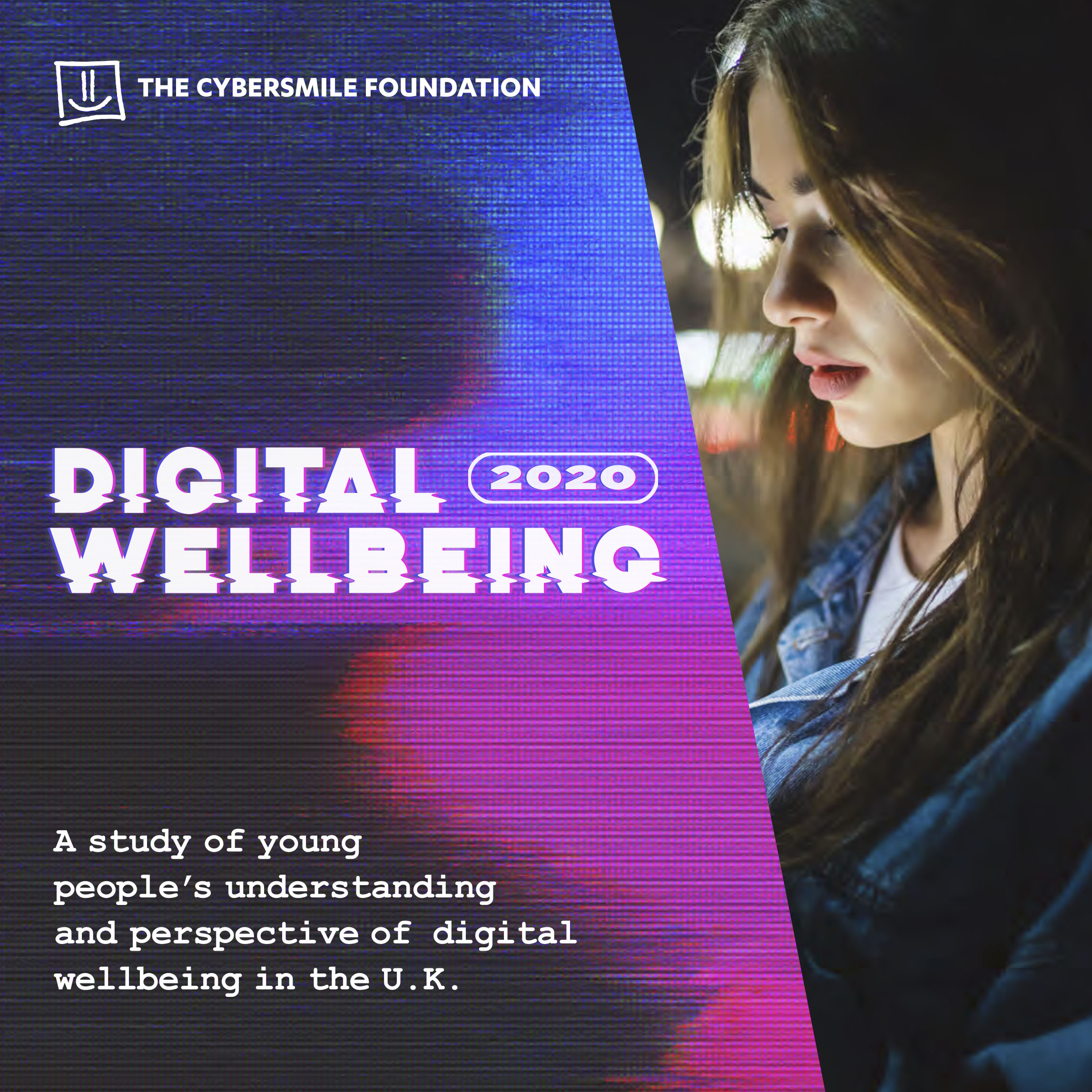Cybersmile Publish National Digital Wellbeing 2020 Report Focusing On Young People's Technology-Related Wellbeing

Our brand new report offers a valuable insight into young people's relationship with technology and their perspective on available support structures such as school and parental environments. You can download the full Digital Wellbeing 2020 report by clicking on the feature image above, or by following the links throughout this article. If you are affected by anything touched on within this article, follow the links to our various support services or click on the blue logo icon at the bottom right of the screen to start using Cybersmile Assistant, our smart AI support assistant.
We are proud to announce the launch of a new national report focusing on digital wellbeing among young people in the U.K.
The Digital Wellbeing 2020 study (click here to download the full report) asked 1000 young people aged 12-16 from across the U.K. a series of 10 questions relating to their overall relationship with technology and how this impacts their physical and mental health. Participants were asked about important topics such as smartphone addiction, parental support, screen-time and other key indicators identified by Cybersmile as areas of potential risk to young people’s mental and physical wellbeing.
“Our Digital Wellbeing 2020 report provides a unique insight into young people’s perspectives regarding their own digital wellbeing, as well as the perceived capabilities of existing support structures within their home and school environments to understand and support them effectively.”
Dan Raisbeck, Co-founder, The Cybersmile Foundation
The study was undertaken to better understand young people’s relationship with their devices and the internet – and how these relationships affect various aspects of their health. The way young people feel about their parental and school support networks, their feelings toward their own parents’ internet use, and the impact of the COVID-19 pandemic on young people’s internet habits are all explored in Digital Wellbeing 2020.
Cybersmile’s commitment to better understand young people’s relationship with technology has been supported by Dr Radha Modgil, an NHS GP & wellbeing campaigner who is a regular medical expert on TV and is currently writing for Top of the Pops magazine. Dr Radha has previously worked on campaigns with BBC Children in Need, Public Health England and the NHS Youth Forum.
“We are all relying much more on technology and online activities for so many aspects of our lives. It has never been more important, therefore, to equip and support people with the knowledge, skills and confidence they need to navigate the internet safely without neglecting their own wellbeing. This is why I am supporting The Cybersmile Foundation who are doing incredible work to help people of all ages not only build the necessary skills to deal with online life and to reach out for support when they need it, but also on the importance of kindness, inclusion and digital wellbeing.”
Dr. Radha Modgil, NHS GP & Wellbeing Expert
The study was conducted by Censuswide on behalf of Cybersmile between May 15th and May 19th across England, Wales, Scotland and Northern Ireland. The regional data offers interesting insights and comparisons for major cities across the U.K. including Belfast, Birmingham, Brighton, Bristol, Cardiff, Edinburgh, Glasgow, Leeds, Liverpool, London, Manchester, Newcastle, Norwich, Nottingham, Plymouth, Sheffield and Southampton.
Key Findings
Below are some of the key findings from our Digital Wellbeing 2020 report:
- 60% of young people feel that the time they spend online negatively impacts other important areas of their life including sleep, diet, exercise and study.
- 46% of young people consider themselves addicted to their smartphone.
- 55% of 16-year-olds consider themselves addicted to their smartphone.
- Over half (51%) of young females consider themselves addicted to their smartphone.
- 42% of young people consider their parents to be addicted to their smartphones.
- 35% of young people feel that internet and social media use negatively affects their mental and/or physical health.
- 18% of young people would like their parents to help them more with reducing the amount of time they spend online.
- Over a quarter (27%) of young people feel that their parents would not know how to help them with online related problems.
- A third (33%) of 16-year-olds feel that their parents would not know how to help them with online related problems.
- 30% of young people feel that their school would not know how to help them with an online related problem.
- 18% of young people do not feel comfortable going to their parents with an online related problem.
- Over a quarter (27%) of 16-year-olds do not feel comfortable going to their parents with an online related problem.
- 9% of young people feel that their parents’ internet social media use has affected their ability to look after them.
- 12% of 13-year-olds feel that their parents’ internet social media use has affected their ability to look after them.
- 63% of young people in Northern Ireland feel their parents are addicted to their smartphones.
- Internet and social media use among young people has doubled during the Covid-19 lockdown with the daily average time spent online among participants aged 12-16 years old increasing from 3 to 6+ hours per day.
You can view the full report by downloading and exploring the Digital Wellbeing 2020 report here. For more in-depth data or further information about the report please contact us.
If you are affected by anything touched on within this article, we can help you. Visit our Help Center or click on the blue logo icon at the bottom right of the screen to open Cybersmile Assistant, our smart AI support assistant. To learn more about Cybersmile and our work, please explore the following recommendations:
- Who Are Cybersmile?
- People We’ve Helped
- Stop Cyberbullying Day 2020 Encourages Kindness And Acceptance Online
- Concerns Raised Over Eating Disorder Content On TikTok
- Cybersmile Help Center
- Managing An Eating Disorder During Lockdown
- The Cybersmile Conversation (Allow a few seconds to load, but worth the wait!)
- Online Hate Targeting Asian People Spikes As Coronavirus Crisis Deepens
- Cybersmile, Cosmopolitan And Instagram Team Up To Launch The Positivity Index
- Cybersmile Experiences 900% Increase In People Seeking Help For Chatroulette Related Issues
- Experts Around The World Warn Parents To Be Vigilant As Cyberbullying Increases During Lockdown
- Body Confidence Influencer Chessie King Announced As Official Cybersmile Ambassador And Media Spokesperson
- Cybersmile Offers Free Digital Education And Support In Response To Coronavirus Crisis
- How To Stay Positive During Lockdown And Self-Isoloation
- Studies Reveal Stark Contrast Between Teenage Male And Female Cyberbullying Incidents
- Cybersmile Campaigns
- What We Do
- Cybersmile Gaming
- New Three-Digit Mental Health Emergency Hotline Set To Launch Across U.S.
- Cybersmile Launch New Gaming Resources With The Support Of Mixer, Microsoft’s Game Streaming Platform
- Catching Up With Zoe Sugg To Discuss Life Online
- Cybersmile And Instagram Announce Anti-Bullying Campaign: Banter or Bullying?
- Cybersmile Publishes National Millennial And Gen Z Study Of Attitudes And Perspectives Toward Social Media Platforms
- Cybersmile And Nerds Candy Announce New International Partnership
- Snapchat Announce New Mental Health Intervention Feature
- Gaming Help Center
- Study Links Negative Effects Of Cyberbullying With Serious Mental Health Problems Among Young People
- Understanding Social Media And Mental Health
- Corporate Partnership Program
- Cybersmile Newsroom
- Become A Cybersmile Sustainer
What do you think about the findings of the report? Let us know by contacting us or tweet us @CybersmileHQ.

